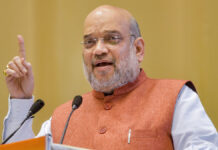A military court in Pakistan has sentenced a Dubai based Indian Naval Commander turned business man Kul Bhushan Yadav to death on charges of carrying out espionage and sabotage activities in Balochistan and Karachi. Pakistan Chief of Army Staff General Qamar Javed Bajwa has confirmed death sentence awarded by the FGCM under the Pakistan Army Act (PAA).
According to Pakistan, Kul Bhushan Yadav was identified as Kulbhusan Sundir Yadav alias Hussein Mubarak Patel. He was arrested on March 3, 2016, through a Counter-Intelligence Operation from Mashkel area of Balochistan for his alleged involvement in espionage and sabotage actives in Pakistan. They believed him to be on-duty for the Indian Navy. Pakistan authorities manufactured a doctored confession video last year. They have leveled charges against Yadav as a spy and tried him through Field General Court martial (FGCM) under section 59 of Pakistan Army Act (PAA) 1952 and Section 3 of official Secret Act of 1923 and awarded death sentence.
Pakistani FGCM found Yadav guilty. They tortured him and forced him to confess before a Magistrate and the Court that he was tasked by RAW to plan, coordinate and organise espionage/sabotage activities aiming to destablise and wage war against Pakistan by impeding the efforts of Law Enforcement Agencies for restoring peace in Balochistan and Karachi. They also claim that Yadav was provided with a defending officer as per legal provisions.
Pakistan has once again tried to prove that India has had a history of fanning terrorism inside Pakistan by sponsoring terrorist outfits in Balochistan, the Federally Administered Tribal Areas, and Karachi. By arresting Kulbhushan Yadav and awarding death sentence, Islamabad has made a futile attempt to substantiate their claim of India’s continued involvement in subversive activities in Pakistan.
Earlier this year, Pakistan’s permanent representative to the UN Maleeha Lodhi handed over a dossier to United Nations (UN) Secretary General Antonio Guterres detailing evidence of Indian subversive activities within Pakistani territory. The dossier contained Yadav’s confessional statement, and related documents and evidence of Indian interference in Balochistan. Video evidence of an Indian Navy submarine sneaking into Pakistani waters on November 18, 2016 was also part of the dossier. The dossier also included proof of contacts of Indian intelligence officials, working under diplomatic cover at Indian High Commission in Islamabad, with terrorists.
Our avid readers might be aware that Yadav had joined the Indian National Defence Academy in 1987 and was commissioned in the engineering branch of Indian Navy in 1991. After an attack on Parliament, he started gathering information and intelligence within India. After 14 years of service he left the service in 2003 and established a small business in Chabahar in Iran.
Pakistani authorities claimed that Yadav during interrogation gave details about funding and plans to destabilize their country. During the joint conference held by the army and the government, Yadav’s video confession was made public. They told that Yadav converted to Islam, adopted a false identity and worked at Gadani under the cover of a scrap dealer. He stated that he was administered to establish a network of operatives, provision of funds, and arrange and smuggle people for terrorism in the country. He said that Yadav told the interrogators to use a code phrase “your monkey is with us”in order to inform the Indian authorities about his arrest. They termed the arrest of Yadav as a big achievement.
India accepted that an officer arrested in Pakistan served with their navy but at the same time denied that he was an agent for intelligence agency. Indian MoEA communicated that Yadav took premature retirement from the navy and the government had no link since his retirement from the Indian Navy. India expounded that Pakistan had fabricated the documents without ascertaining discrepancies. Pakistan has previously raised concerns over involvement of foreign elements in terrorist activities in its territory but this was the first instance of India acknowledging the arrest across the border of an individual associated with its armed forces.
Infact, Yadav was abducted by Pakistan’s forces from Iran-Pakistan border and that Pakistan has fabricated the documents on the retired naval officer, Kulbhushan Jadhav, and leaked them without realising glaring inconsistencies in the same. Extremist Sunni radical group, Jaish ul-Adl is responsible for the kidnapping of Yadav from the Iran-Pakistan border. Yadhav owns a cargo business in Iran and had been working out of Bandar Abbas and Chabahar ports.
The Indian High Commission has also sought consular access to Yadav but Pakistan has not agreed to it. It is a completely doctored video, fake video made by Pakistan. Yadhav might have been trapped by Pakistan authorities after they came to know of his background and it could be a planned operation to fabricate documents and later show the arrest from Chaman. Indian intelligence officials suspect that Yadav was abducted from the Iran-Pakistan border by an extremist radical group called Jaishul Adil, a terrorist organisation by Iran, is linked to the Al Qaeda and has been accused of targeting Iranian border guards. Indian agencies have stated that the video released by Pakistan was heavily edited and the audio has been spliced in several places. There are inconsistencies between the claims made by Baluchistan minister Sarfaraz Bugti that Yadav was picked up from Chaman on the Afghanistan border and those made by Pakstan that he was picked from Saravan.
In India, a section of media televised that India had sought consular access to assess the facts but Pakistan denied it on the pretext of his claimed involvement in terrorist activities. Pakistani High Commission briefed that no paperwork from India was received in this regard.
On 10 April 2017, Yadav was sentenced to death by a Field General Court Martial (FGCM) in Pakistan. Thereafter, the government of India summoned Pakistani High Commissioner to India, Abdul Basit and issued a demarche stating that the proceedings that led to Yadav’s sentencing were farcical and that India would regard Yadav’s execution as murder in the first degree. Sushma Swaraj, India’s Minister of External Affairs said there was no evidence of any wrongdoing by Yadav and termed his sentencing an act of “premeditated murder”. Swaraj said that if Pakistan implemented the death sentence, the bilateral relations between both countries would face dire consequences.
It is high time that India must take more coordinated steps to see that the life of an Indian retired Naval Officer is saved. Our government must not leave any stone unturned including legal battle, diplomatic and even military action to free an innocent Indian from the clutches of Pakstan’s premeditated murder. April 16-30-2017





































